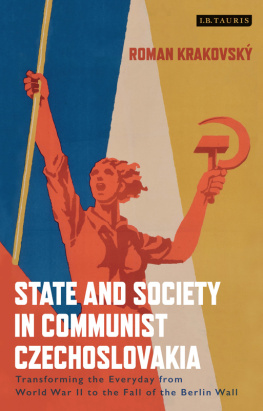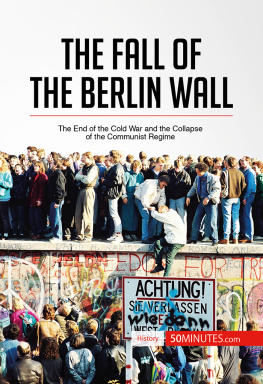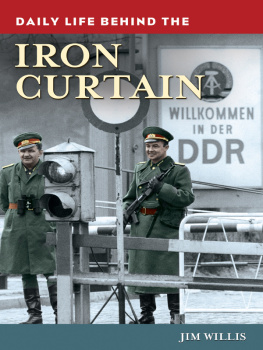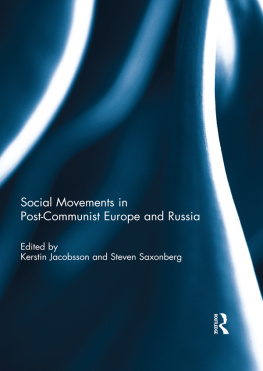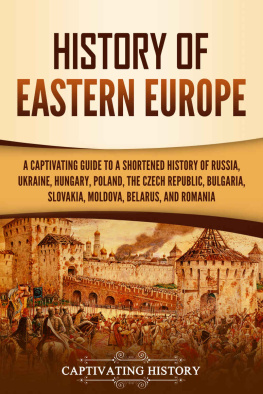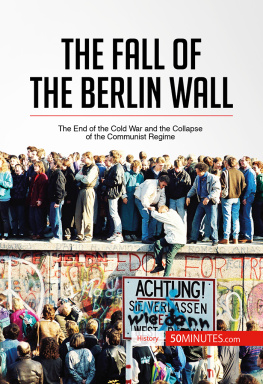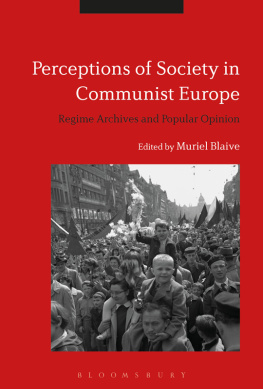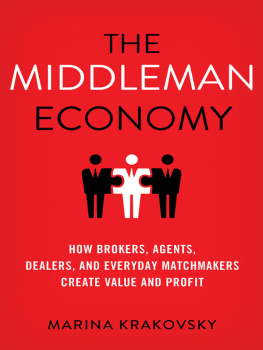
Roman Krakovsk is Lecturer at the University of Geneva. He received his PhD in 2012 from the Universit Paris-Sorbonne and won a number of awards for his doctoral thesis, among them the Prix d'histoire sociale and the Fraenkel Prize in Contemporary History.
This is a refreshing new approach to east European communist regimes. While most work concentrates on economic weaknesses and political oppression, this book has an innovative focus: the relationship between state and society and the regimes attempts to control the citizens private sphere, the failure of which was a major contributing factor in their collapse. I warmly recommend it!
Ivn T. Berend, Distinguished Research Professor,
University of California, Los Angeles (UCLA)
Why and how were communist societies attractive to those who lived in them? Why and how did they become less and less attractive and eventually intolerable? In his remarkable study Roman Krakovsk offers what he calls pieces of a jigsaw puzzle which help us answer these questions but also highlight the need for further research. With originality and wit, he analyses the changed social construction of time and space under Czechoslovakian communism initially inspiring hope in progress but eventually triggering disillusionment as the promised progress was not sustained. The imposition of too much order began to produce its opposite, until the last great attempt to reinvent the world collapsed. Krakovsk's jigsaw is rich and suggestive and very rewarding.
Ben Barkow, Director of the Wiener Library
for the Study of the Holocaust and Genocide
In State and Society in Communist Czechoslovakia, Roman Krakovsk considers the heart of communism: its desire to master time and space. This book's revelations are very often groundbreaking and their implications go far beyond communist Czechoslovakia. This is important reading for all scholars of twentieth-century Europe.
Paul Gradvohl, Junior Professor,
University of Lorraine
One of the finest examples of a younger school of French studies on the social history of communism distinguishing themselves from the international mainstream by their unique blending of history in the tradition of the Annales school, socio-anthropological (Bourdieu) and (post-)structuralist thinking (Foucault). English readers will have the opportunity not only to learn a lot about how communist rule and its ideology functioned on the micro-level of everyday life but also to get acquainted with the specifically French epistemological idiom in contemporary history writing which deserves a broad reception in the international community of scholars of modern history.
Thomas Lindenberger, Director, Hannah Arendt Institute
for the Research on Totalitarianism, TU Dresden

Published in 2018 by
I.B.Tauris & Co. Ltd
London New York
www.ibtauris.com
Copyright 2016 Publications de la Sorbonne Paris, France
English translation copyright 2018 Jennifer Higgins
This book was published thanks to the financial support of the LabEx Tepsis Project supported by the Pres Hesam (ANR 11 LABX 0067) and the French National Research Agency (ANR 11 IDEX 0006 02), as well as the Centre national de la recherche scientifique (CNRS) CERCEC Lab (CNRS-EHESS).
The right of Roman Krakovsk to be identified as the author of this work has been asserted by the author in accordance with the Copyright, Designs and Patents Act 1988.
All rights reserved. Except for brief quotations in a review, this book, or any part thereof, may not be reproduced, stored in or introduced into a retrieval system, or transmitted, in any form or by any means, electronic, mechanical, photocopying, recording or otherwise, without the prior written permission of the publisher.
Every attempt has been made to gain permission for the use of the images in this book. Any omissions will be rectified in future editions.
References to websites were correct at the time of writing.
International Library of Twentieth Century History 104
ISBN: 978 1 78453 914 6
eISBN: 978 1 78672 367 3
ePDF: 978 1 78673 367 2
A full CIP record for this book is available from the British Library
A full CIP record is available from the Library of Congress
Library of Congress Catalog Card Number: available
In memory of my mother
CONTENTS
LIST OF ILLUSTRATIONS
Figures
Float belonging to the aircraft manufacturer Walter, May 1948. Czech National Archives, f. Centrln katalog, heslo 1. mje.
Poster for the first Five-Year Plan, 1949: The Five-Year Plan, the path to socialism [] Let's get going! Source: Author's private collection.
Poster for the second year of the first Five-Year Plan, 1950: The second year. We are increasing the pace. Onwards towards socialism. Moravsk galerie v Brn.
Poster for the counter-plan for the first Five-Year Plan, 1948: We will get there! We will complete the two-year plan by 28 October 1948, thanks to the counter-plan! Moravsk galerie v Brn.
An allegorical float in Prague's May Day parade, 1968. The sign dates from the 1930s and reads: We urgently demand immediate wellbeing. Deadline: 2 May 1968. Czech National Archives, f. Centrln katalog, heslo 1. mje.
The city of ilina and the surrounding area in northern Slovakia. Laurent Tournier, Publications de la Sorbonne.
A Soviet factory calendar from 1930 which combines the Gregorian calendar, the traditional seven-day week and Soviet and nepreryvka public holidays, with the first day of each cycle marked in a different colour. History Today.
A Soviet calendar from 1933 which shows the Gregorian calendar, the traditional seven-day week, five national public holidays and the chestidnevki six-day week. History Today.
The National Work campaign, 28 October 1946. Czech National Archives, f. Centrln katalog.
The National Work campaign, 26 October 1947. Czech National Archives, f. Centrln katalog.
Poster for holidays in properties owned by a trade union, 1949: Holidays with the union, reserved for the best workers. Moravsk galerie v Brn.
The National Work for Victory campaign, 1948: It was just like a story The worker pulls the beetroot [which carries the phrase Our work], and pulls again, but cannot move it. The transport worker comes to his aid. He pulls and pulls but the beetroot does not come out. The baker, the student, the soldier, etc., join them. They all pull together and and the work for victory was a success. Source: Rud prvo, 21 March 1948.
Cartoon of petty-bourgeois chalet culture: At home (top) and In the countryside (bottom) published in Chata a chalup, a magazine devoted to holiday chalets, 1969.
Floor plan of a typical three-bedroom apartment (74 square metres) in which the children and parents have separate rooms, 1980. Source: Lada Hubatov-Vackov and Cyril ha (eds), Huskovo 3+1, Prague, VUP, 2007: 110.
Allegory of national unity, Prague, 1 May 1946: The strength of the nation is in unity. Czech National Archives, f. Centrln katalog, heslo 1. mje.
Allegory of national unity, Prague, 1 May 1947: Strength is in the Communist Party! The text on the banner reads: Traders of Vysoany at the workers' side. Czech National Archives, f. Centrln katalog, heslo 1. mje.
Allegory of unity, Prague, 1 May 1950. Czech National Archives, f. Centrln katalog, heslo 1. mje.
The start of the May Day parade, Prague, 1950. Czech National Archives, f. Centrln katalog, heslo 1. mje.
Next page
